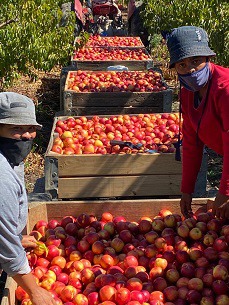 In the orchards of Ceres Cascade Farms in Prince Alfred Hamlet, where it is not unusual to see all manner of wild buck undisturbed by orchard activities, the stone fruit harvest is firing on all cylinders for the next two months, says Pietie Wolfaardt, owner of Ceres Cascade Farms.
In the orchards of Ceres Cascade Farms in Prince Alfred Hamlet, where it is not unusual to see all manner of wild buck undisturbed by orchard activities, the stone fruit harvest is firing on all cylinders for the next two months, says Pietie Wolfaardt, owner of Ceres Cascade Farms.
They’ll be picking peaches and nectarines into March, before they turn their attention to their Forelle pears.
Currently they are harvesting Bradford varieties like Coral Princess and December Princess, very aromatic peaches which, he notes, have not yet been widely planted in South Africa, although there is some expansion in the amount of white fleshed peaches being planted at the moment.
Their first peaches, nectarines, and prunes are already in Europe and the UK (exported through Stems Fruit) where the market is looking fair although supermarket prices have been on more or less the same level for a few years, despite the enormous price inflation producers are experiencing.
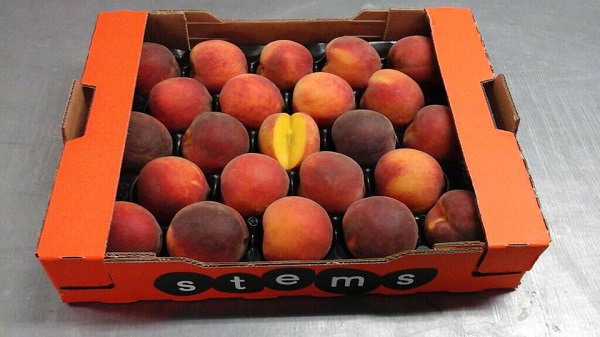 Stems Fruit exports the stonefruit grown by Ceres Cascade (photos supplied by Ceres Cascade)
Stems Fruit exports the stonefruit grown by Ceres Cascade (photos supplied by Ceres Cascade)
Improved logistics this season
“In Europe, consumers have less disposable income. However, last season the biggest impact on our income wasn’t necessarily prices but it was logistical delays: in the harbours, on the vessels, and even on the receiving side,” he says.
“Where the sea journey is usually between 23 and 28 days, we had fruit that took as much as 56 days. It had devastating consequences for the stone fruit industry which took a serious knock. It was partly caused by the delay and partly the war in Ukraine to which we have exposure on our Forelle pears which follow our stone fruit.”
After last year’s travel times of up to eight weeks, they had no choice but to shoulder the costs to have some of their unsaleable fruit – sold on consignment – disposed of in the EU.
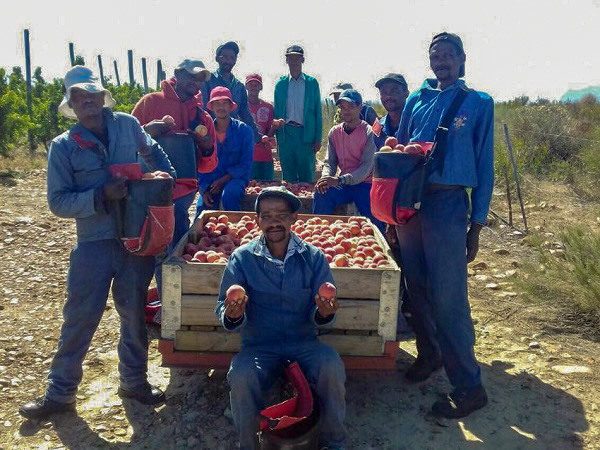
This season logistics are faring better. “Our representative body Hortgro has close and regular contact with the port authorities and we can see a big improvement, especially in planning.”
Half of their stone fruit is sold domestically where, Pietie says, the local market is going surprisingly well for Ceres Cascade Farms, but the market is under pressure with stone fruit from the Western Cape that wasn’t exported due to heavy rains in December.
Especially prunes are in high demand, a niche fruit for which South African consumers pay prices that rival the export prices they’re getting from the UK.
Fresh peaches & nectarines: a cash cow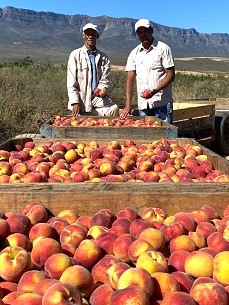 “We also have traditional canning peach varieties which are all sold fresh under our Fairest Fruit brand. It used to be the farm’s cash cow because we never supplied canning factories. Johannesburg is our biggest market, they move a tremendous amount of fruit, and Food Lovers Market and Impala Fruit & Veg in Johannesburg. We supply the Pretoria market too.”
“We also have traditional canning peach varieties which are all sold fresh under our Fairest Fruit brand. It used to be the farm’s cash cow because we never supplied canning factories. Johannesburg is our biggest market, they move a tremendous amount of fruit, and Food Lovers Market and Impala Fruit & Veg in Johannesburg. We supply the Pretoria market too.”
Right: Kleinjan Muller (left) and Abrial Lee (right)
Now they’re phasing out some of these varieties because of the demise of the South African fruit canning industry: a large amount of peaches and nectarines that would’ve gone into processing will in future be sent to the domestic market, creating an oversupply.
“We have enormous price inflation on the farm in our direct input costs, the exchange rate and electricity which is an enormous issue for us. I have just fixed a diesel engine that last pumped water in 1990 - fortunately I never threw it away!”
Like many in the fruit industry, Pietie talks about perseverance. “We just have to keep making plans. We just have to get through this.”
Farming fruit in a biodiverse environment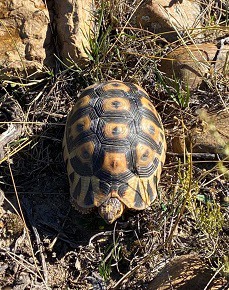 He is not just thinking of the farm and facilities, but of the broader environment and the habitat that could be created by orchards.
He is not just thinking of the farm and facilities, but of the broader environment and the habitat that could be created by orchards.
Right: an angulate tortoise found on the farm
“We’re trying to steer away from the use of harsh chemicals towards softer and more target-specific products which could cost you six to ten times more."
He continues: "We’re driven partly by the requirements of our retail clients and consumers, but also because it is exciting to see the return of wild animals to the farm and the orchards since we’ve been using softer chemicals, especially birds and raptors, but also wild buck and hyraxes and hares.”
There are Cape leopard in the Skurweberge mountains surrounding the farm which is a surefire deterrent to the baboons who appreciate stone fruit just as much as humans.
He encourages staff to take pictures of the wildlife they encounter on the farm for their Facebook Page as a way to keep track of the existence of certain species.
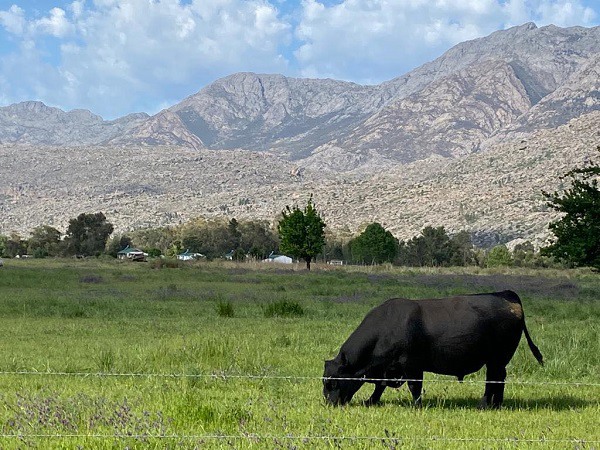 The aptly-named Skurweberge ("rough mountains")
The aptly-named Skurweberge ("rough mountains")
They have also partnered with neighbouring farms to establish a conservation area, the Waboomsberg Bewarea, to address other ecological issues such as alien plant species, soil erosion, and the re-establishment of natural vegetation.
“It’s all about achieving balance in the orchards. We want to leave the farm a better place for those coming after us. I would say that there is a much bigger consciousness of the farm’s role in the ecological system than 10 or 20 years ago.”
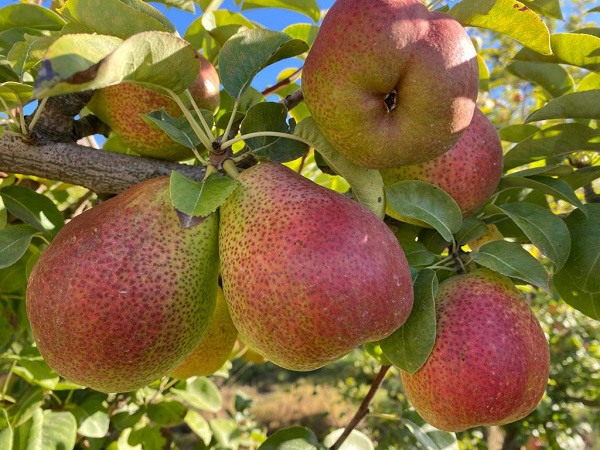 Forelles end off the deciduous season for Ceres Cascade
Forelles end off the deciduous season for Ceres Cascade
Change in rainfall patterns
What they have also noticed, is that rainfall patterns are moving later.
“These days cold fronts are moving over into springtime and we can see this, because we have storm water rights along the Breë River but only up to 30 September. After that date the rights transfer to inhabitants along the river, a few million water users, until the river runs into the ocean. We can see the rainfall is coming later and it’s putting pressure on our water sources.”
Even more conscious and careful water management techniques will have to be implemented, along with cover crops like Triticale, either planted in between the orchard rows (if the buck will let it) or grown and baled elsewhere and later lain down as mulch.
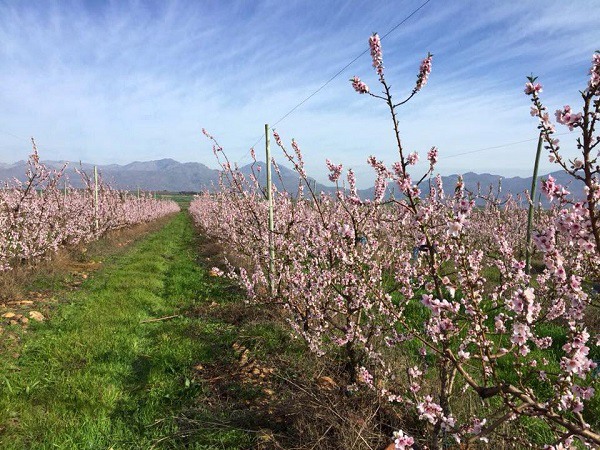
 For more information:
For more information:
Pietie Wolfaardt
Ceres Cascade
Tel: +27 23 313 3872
Email: [email protected]
https://www.facebook.com/CeresCascadeFarms/
